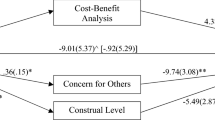Abstract
We test conformity-related values applying the value-pragmatics hypothesis by evaluating how personal values related to compliance moderate the relationships between situational factors and unethical decisions. We examine the direct and indirect effects of the values of traditionalism, conformity, and stimulation, as they combine with the situational factors of rewards and punishments in the person–situation interaction model. We find strong support for the value-pragmatics view of ethical decision making and further build support for the person–situation interaction model.
Similar content being viewed by others
References
Allport, G. 1961. Pattern and Growth in Personality. New York, Holt, Rinehart, Winston.
Arendt, H. 1963. Eichmann in Jerusalem: A Report on the banality of evil. New York: Penquin Books.
Asch, S. 1956. Studies of Independence and Conformity. Psychological Monographs, 70(9): 70–79.
Ashkanasy, N., Windsor, C., & Trevino, L. 2006. Bad Apples in Bad Barrels Revisited: Cognitive Moral Development, Just World Beliefs, Rewards, and Ethical Decision Making. Business Ethics Quarterly, 16(4): 449–473.
Bandura, A. 1969. Social learning of moral judgments. Journal of Personality and Social Psychology 11(3): 275–279.
Butterfield, K. D., Treviño, L. K., & Weaver, G. R. 2000. Moral awareness in business organizations: Influences of issue-related and social context factors. Human Relations, 53(7): 981–1018.
Chomsky, N. 1977. Essays on Form and Interpretation. Cambridge, MA: MIT Press.
Church, B., Gaa, J., Nainer, S., & Shehata, M. 2005. Experimental evidence of the Person Situation Interactive Model of Ethical Decision Making. Business Ethics Quarterly, 15(3): 363–383.
Darley, J. 1992. Social Organization for the Production of Evil. Psychological Inquiry, 3(2): 199–218.
Dawson, J. & Richter, A. 2006. Probing Three-Way Interactions in Moderated Multiple Regression. Journal of Applied Psychology, 91, 917–926
Edwards, J. 1991. Person-Job Fit: A Conceptual Integration, Literature Review, and Methodological Critique. In C. Cooper & I. Robertson (Eds.), International Review of Industrial and Organizational Psychology, Vol. 6: 283–357. New York: Wiley.
Feather, N. 1995. Values and Choice: The Influence of Choice Alternatives. Journal of Personality and Social Psychology, 68(11): 1135–1151.
Festinger, L. 1957. A Theory of Cognitive Dissonance. Stanford, CA: Stanford University Press.
Gilligan, C. 1982. In a Different Voice. Cambridge, MA: Harvard.
Greenburg, J. 2002. Who Stole the Money and When? Individual and Situational Determinants of employee Theft. Organizational Behavior and Human decision Processes, 89(3): 985–1003.
Grice, H. 1991. The Conception of Value. Oxford, UK: Clarendon Press.
Grube, J., Mayton, D., & Ball-Rokeach, S. 1994. Inducing Change In Values, Attitudes, and Behaviors: Belief System Theory and the Method of Value Self-Confrontation. Journal of Social Issues, 50(4): 153–173.
Hodges, B. H. & Geyer, A. L. 2006. A nonconformist account of the Asch experiments: Values, pragmatics, and moral dilemmas. Personality and Social Psychology Review, 10(1): 2–19.
Johnston, M. 1988. Self-deception and the Nature of Mind. In B. McLaughlin & A. Rorty (Eds.), Perspectives on Self-Deception: 63–91. Berkeley, CA: University of California Press.
Jones, T. 1991. Ethical decision making by individuals in organizations: An issue-contingent model. Academy of Management Review, 16(2): 366–395.
Kluckhohn, C. 1951. Values and Value Orientations in the Theory of Action: An Exploration in Definition and Classification. In T. Parsons & E. Shils (Eds.), Toward a General Theory of Action. Cambridge, MA: Harvard University Press.
Kohlberg, L. 1984. The Psychology of Moral development. San Francisco, CA: Harper & Row.
Kohn, M. 1965. Class and Conformity. Homewood, IL: Dorsey Press.
MacDonald, G., Nail, P., & Levy, D. 2004. Expanding the Scope of the Social Response Context Model. Basic and Applied Social Psychology, 26(1): 77–92.
Millgram, S. 1963. The Behavioral Study of Obedience. Journal of Abnormal & Social Psychology 67(3): 371–378.
Mumford, M., Connelly, M., Helton, W., Van Dorn, J., & Osburn, H. 2001. Alternative Approaches for Measuring Values: Direct and Indirect Assessment in Performance Prediction. Journal of Vocational Behavior, 61(2): 348–373.
Nail, P., MacDonald, G., & Levy, D. 2000. Proposal of a Four Dimensional Model of Social Response. Psychological Bulletin, 126(3): 454–470.
Piaget, J. 1965. The Moral Development of the Child. New York: Free Press.
Ravlin, E. & Meglino, B. 1987. Issues in Work Value Measurement. Research in Corporate Social Performance, 9(9): 153–183.
Rest, J., Narvaez, D., Bebeau, M., & Thoma, S. 1999. Post-conventional moral thinking: A neo-kohlbergian Approach. Mawah, NJ: Lawrence Erlbuam.
Rest, J., Narvaez, D., Thoma, S., & Bebeau, M. 2000. A Neo-Kohlbergian Approach to Moral Research. Journal of Moral Education, 29(4): 381–395.
Rokeach, M. 1973. The Nature of Human Values. New York: Free Press.
Rorty, R. 1989. Contingency, Irony and Solidarity. Cambridge, UK: Cambridge University Press.
Safer, M.: 2007, Prisoner 5H834523, 60 Minutes: 13.15 Minutes (Columbia Broadcasting System, USA).
Schwartz, S.: 1996, Value Priorities and Behavior. In: S. Seligman, J. Olson & M. Zanna (Eds.), The Psychology of Values: The Ontario Symposium, Vol. 8. Mahwah, NJ: Lawrence Erlbaum Associates, Publishers, pp. 1–24
Schwartz, S. 2006. Basic Human Values: Theory, Measurement and Applications. Revue francaise de sociologie, 4(74): 1–35.
Schwartz, S.: 2007, Personal Communication
Trevino, L. 1986. Ethical decision making in organizations: A person-situation interactionist model. Academy of Management Review, 11(3): 601–617.
Trevino, L. & Youngblood, S. A. 1990. Bad apples in bad barrels: A causal analysis of ethical decision-making behavior. Journal of Applied Psychology, 75(4): 378–385.
Wannsee Conference: 2007, http://www.ushmm.org/wlc/
Watson, G., Papamarcos, S., Teague, B., & Bean, C. 2004. Exploring the Dynamics of Business Values: A Self-Affirmation Approach. Journal of Business Ethics, 49(4): 337–357.
Zimbardo, P. 1974. On Obedience to Authority, American Psychologist, 24(3): 566–567.
Author information
Authors and Affiliations
Corresponding author
About this article
Cite this article
Watson, G.W., Berkley, R. Testing the Value-Pragmatics Hypothesis in Unethical Compliance. J Bus Ethics 87, 463–476 (2009). https://doi.org/10.1007/s10551-008-9953-3
Published:
Issue Date:
DOI: https://doi.org/10.1007/s10551-008-9953-3




